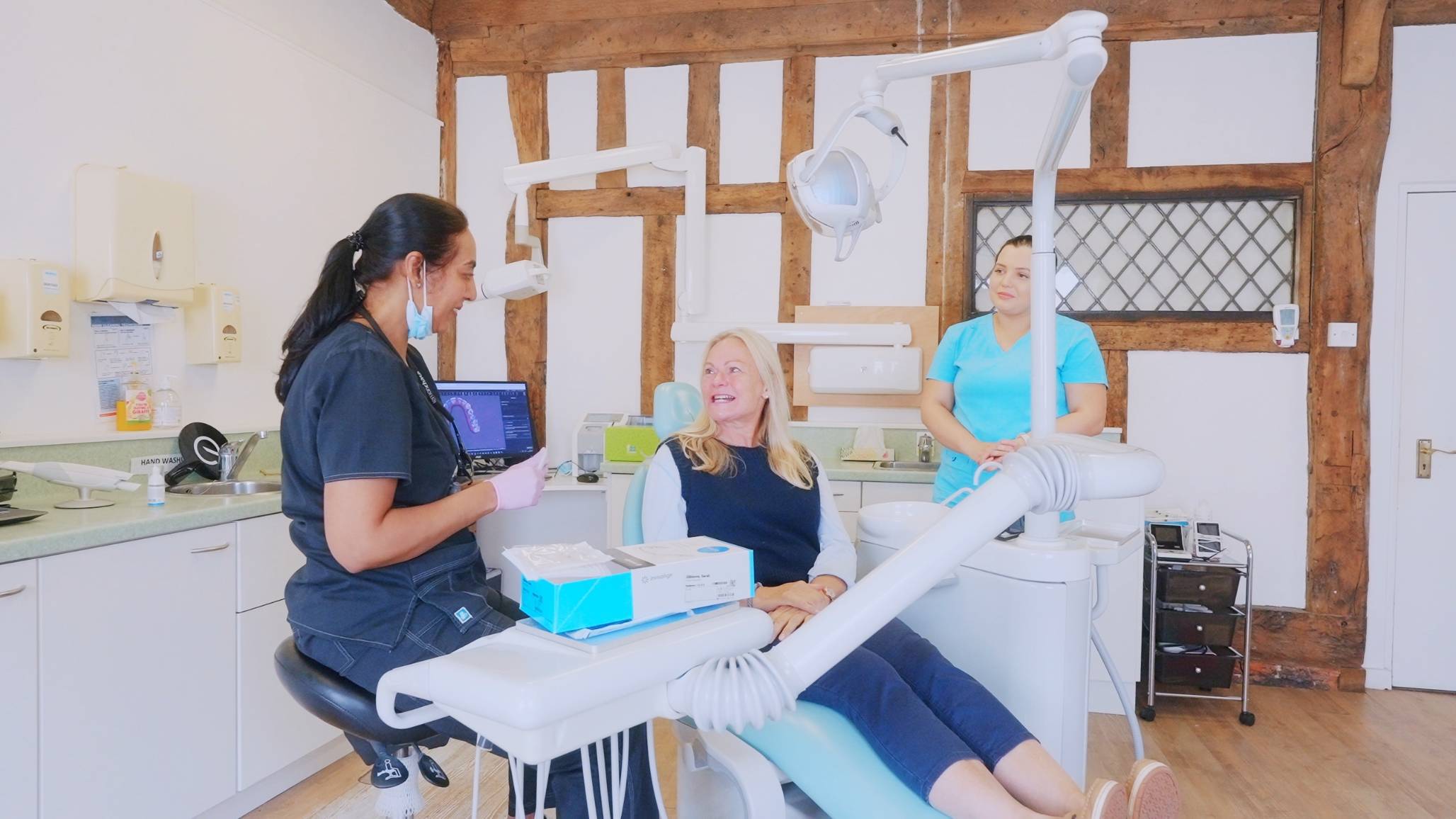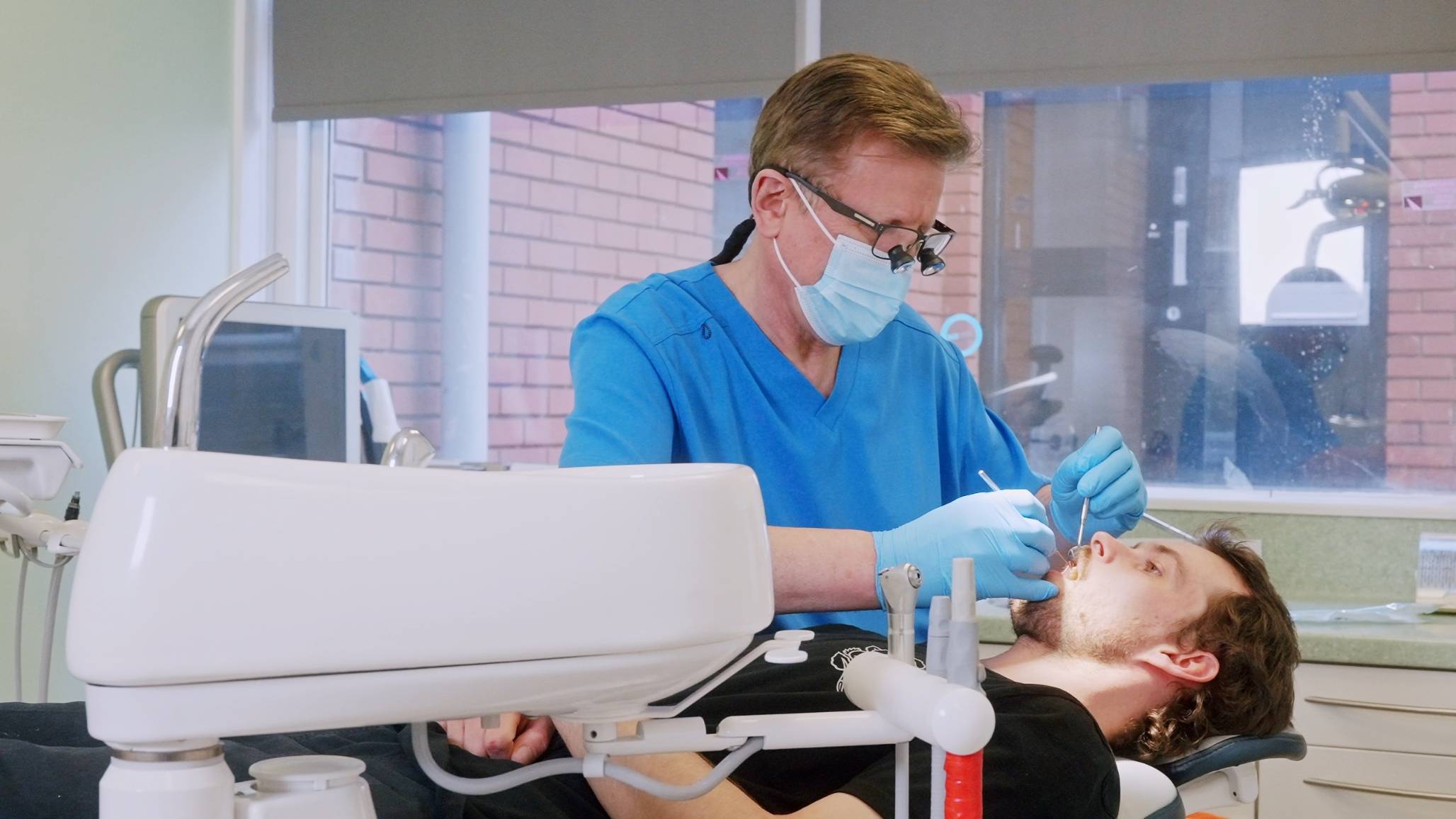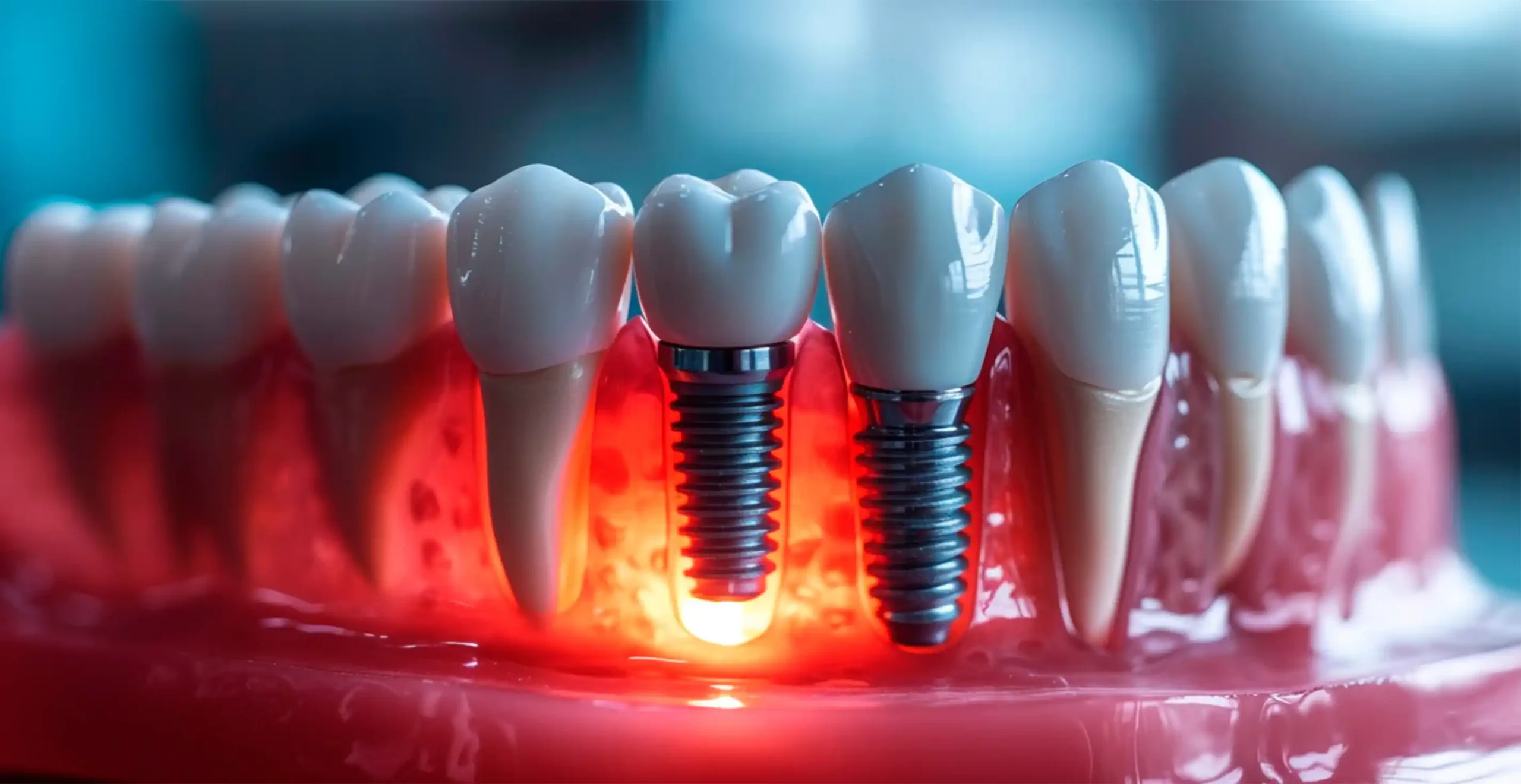When it comes to replacing missing teeth, you have several options to consider, including dental implants, dentures, and bridges. Each option has its own set of benefits and drawbacks, and understanding these can help you make an informed decision about which is the best choice for your oral health.
Read more: Dental Implants vs Dentures and Bridges: Why Implants Are BetterChoosing the right solution for replacing missing teeth is a critical decision for your oral and overall health. While dentures and bridges offer viable options, dental implants stand out as the superior choice due to their longevity, durability, and numerous health benefits. By preserving jawbone density, improving oral function, and providing a natural appearance, dental implants offer a permanent and reliable solution.
In this comprehensive guide, we’ll delve into why dental implants are often regarded as the superior solution, offering a permanent, stable, and aesthetically pleasing alternative to dentures and bridges.
What are dental implants?
Dental implants are artificial tooth roots crafted from biocompatible materials, most commonly titanium. Titanium is favored because it is well-tolerated by the body and integrates effectively with the bone. The process begins with a surgical procedure in which the implant is placed directly into the jawbone. Over the next few months, the implant undergoes a process known as osseointegration.
Benefits of dental implants
Dental implants offer numerous benefits over dentures and bridges. Here are some key advantages.
1. Longevity and Durability
Dental implants are designed to be a long-term solution. With proper care, they can last a lifetime, unlike dentures and bridges which may need to be replaced every 5 to 15 years. The titanium used in implants is highly durable and resistant to decay, ensuring your new teeth stay strong and functional.
2. Bone Preservation
One of the significant advantages of dental implants is their ability to preserve bone health. When a tooth is lost, the underlying jawbone begins to deteriorate due to lack of stimulation. Implants mimic natural tooth roots and stimulate the bone, preventing bone loss and maintaining facial structure.
3. Improved oral function
Dental implants restore full chewing power, allowing you to eat your favorite foods without restriction. They also provide better speech compared to dentures, which can slip and cause mumbling or slurring.
4. Aesthetic Appeal
Implants look and feel like natural teeth. They are custom-made to match the color, shape, and size of your existing teeth, providing a seamless and natural appearance. Unlike dentures, which can sometimes appear artificial, implants blend in perfectly with your smile.
5. No impact on adjacent teeth
Dental implants do not require alteration of adjacent teeth, as is necessary with traditional bridges. This preservation of natural tooth structure is crucial for long-term oral health.
6. Improved oral health
Dental implants help maintain the health of the jawbone by providing the necessary stimulation to prevent bone resorption. When a tooth is lost, the bone that once supported it begins to deteriorate. Implants mimic the role of natural tooth roots, stimulating the bone and preserving its density and volume.
7. Enhanced aesthetics
Implants offer a natural-looking solution that enhances the overall appearance of your smile. The crowns, bridges, or dentures attached to the implants are designed to blend seamlessly with your existing teeth, providing a harmonious and aesthetically pleasing result.
8. Restored Functionality
With dental implants, you can enjoy a wide variety of foods without worry. The stability provided by osseointegration ensures that your implants can withstand the forces of chewing and biting, restoring your ability to eat comfortably and confidently.
9. Speech improvement
Missing teeth and ill-fitting dentures can affect your speech, causing slurring or mumbling. Dental implants provide a stable foundation for your replacement teeth, helping you speak clearly and confidently.
10. Convenience and comfort
Dental implants eliminate the discomfort and inconvenience associated with removable dentures. There are no clasps or adhesives required, and you won’t have to worry about your dentures slipping or clicking during eating or speaking.
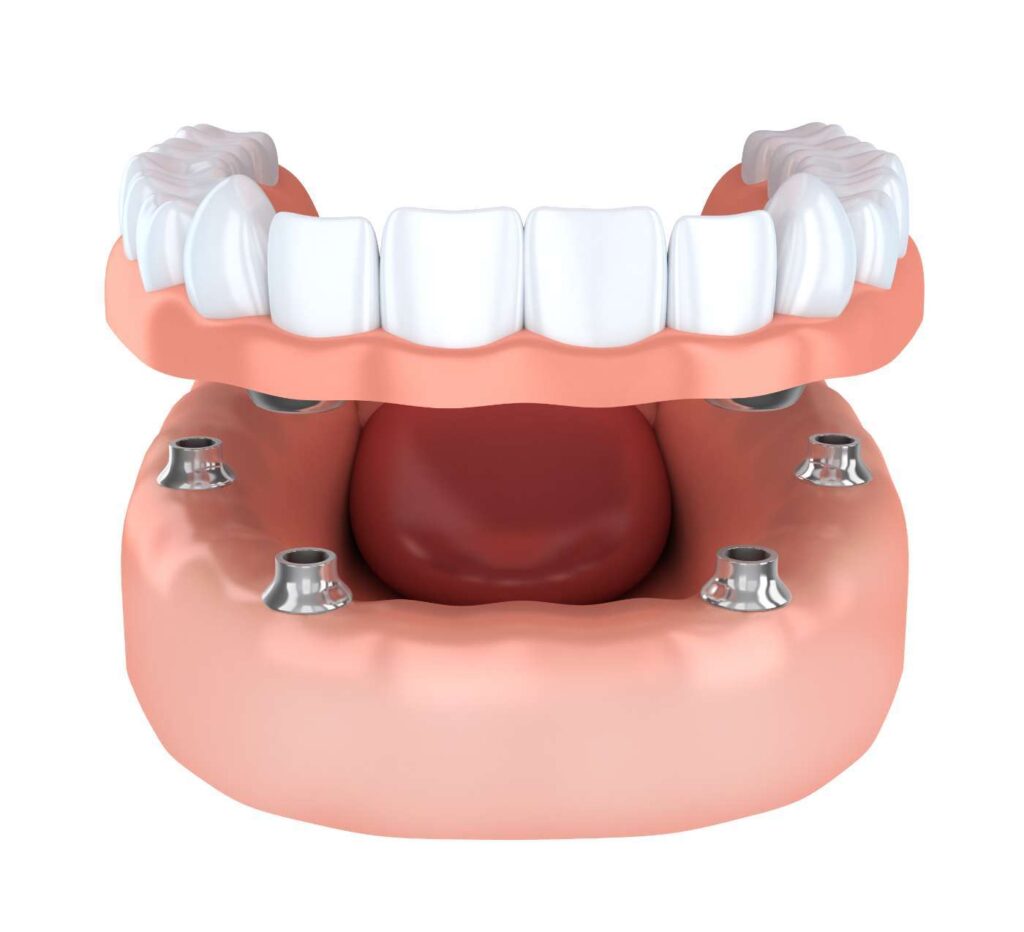
The dental implant process
Understanding the dental implant process can help alleviate any apprehensions you may have. Here’s a detailed overview:
1. Initial consultation
The journey begins with a comprehensive consultation with your dentist or oral surgeon. During this visit:
- Assessment: The dentist will evaluate your oral health, take X-rays or 3D scans, and determine the condition of your jawbone.
- Discussion: Your medical history, treatment goals, and expectations will be discussed to ensure implants are the right choice for you.
2. Treatment Planning
If you are a suitable candidate, a personalized treatment plan will be developed. This plan includes:
- Imaging and Impressions: Detailed images and impressions of your teeth and jaw are taken to plan the precise placement of the implants.
- Planning Surgery: The dentist will plan the surgical procedure, including the number of implants needed and their exact locations.
3. Implant Placement
The actual implant placement involves:
- Surgery: Under local anesthesia or sedation, the dentist will make an incision in the gum to expose the bone, drill a small hole, and place the implant.
- Healing Period: After placement, the implant needs time to fuse with the jawbone. This healing process, known as osseointegration, can take several months.
4. Attaching the Abutment
Once osseointegration is complete:
- Abutment Placement: A small connector, called an abutment, is attached to the implant. This piece will hold the new tooth in place.
- Gum Healing: The gums will need a few weeks to heal around the abutment before the final restoration is placed.
5. Placing the Crown
The final step involves placing the custom-made crown:
- Crown Fabrication: The crown is crafted based on impressions to match your natural teeth.
- Attachment: The crown is securely attached to the abutment, completing the restoration.
Comparing Dental Implants to Dentures and Bridges
To understand why dental implants are often preferred, it’s essential to compare them with dentures and bridges:
Dentures
Advantages:
- Cost: Dentures are generally less expensive upfront than implants.
- Non-Surgical: The process of getting dentures is non-invasive and doesn’t require surgery.
- Quick Solution: Dentures can be made relatively quickly compared to the longer process of getting implants.
Disadvantages:
- Stability: Dentures can slip and move, causing discomfort and difficulty with speaking and eating.
- Bone Loss: Dentures do not provide the stimulation needed to prevent jawbone deterioration.
- Maintenance: Dentures require regular maintenance, cleaning, and potential adjustments or replacements.
- Appearance: Over time, dentures may not look as natural as implants.
Bridges
Advantages:
- Fixed Solution: Unlike dentures, bridges are fixed in place and do not move.
- Aesthetic Improvement: Bridges provide a natural appearance and improve the look of your smile.
Disadvantages:
- Impact on Adjacent Teeth: Bridges require the alteration of healthy adjacent teeth to support the artificial tooth, which can compromise their structure and health.
- Longevity: Bridges typically last 5-15 years and may need to be replaced or repaired over time.
- Bone Loss: Like dentures, bridges do not prevent jawbone loss.
Cost Considerations
While dental implants tend to be more expensive initially, their longevity and durability often make them a cost-effective solution in the long run. Dentures and bridges, while cheaper upfront, may incur additional costs over time due to replacements and ongoing maintenance.
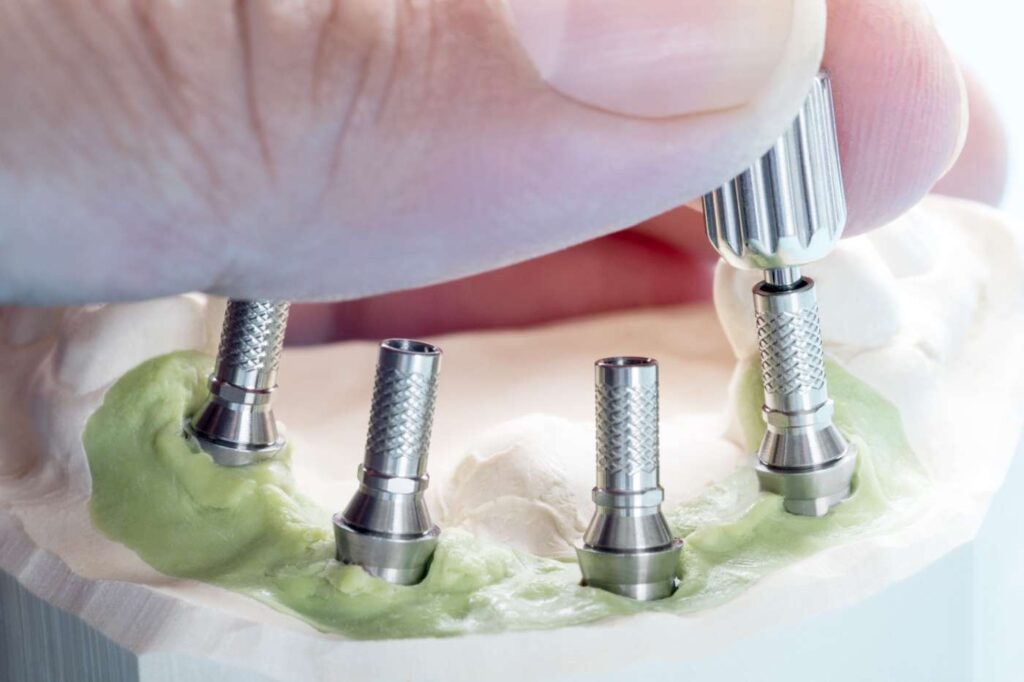
Common Questions About Dental Implants
Are dental implants painful?
The implant procedure is typically performed under local anesthesia or sedation, so you should not feel pain during the surgery. Post-surgery discomfort is usually mild and can be managed with over-the-counter pain medications.
How long does the implant process take?
The entire process can take several months, from initial consultation to the final placement of the crown. The healing period for osseointegration is the longest phase, usually taking 3-6 months.
What is the success rate of dental implants?
Dental implants have a high success rate, generally around 95-98%. Success depends on various factors, including the patient’s oral and overall health and adherence to post-surgical care instructions.
How do I care for dental implants?
Caring for dental implants is similar to caring for natural teeth. Regular brushing, flossing, and dental check-ups are essential to maintain implant health. Unlike dentures, implants do not require special cleaning solutions or adhesives.
Can anyone get dental implants?
Most people with missing teeth are candidates for dental implants, but there are some exceptions. Patients with insufficient jawbone density, uncontrolled diabetes, or certain medical conditions may not be suitable candidates. A thorough evaluation by a dental professional is necessary.
The role of dental implants in oral health
Dental implants play a crucial role in maintaining overall oral health.
Preventing bone loss
As mentioned earlier, implants stimulate the jawbone, preventing the bone loss that typically follows tooth loss. This preservation of bone density helps maintain facial structure and prevents the sunken appearance often associated with missing teeth.
Enhancing oral hygiene
Implants allow for better oral hygiene compared to dentures and bridges. Since they function like natural teeth, you can brush and floss normally without needing special tools or techniques. This simplicity helps prevent gum disease and other oral health issues.
Improving Nutrition
With dental implants, you can eat a wide variety of foods without worry. This ability to chew efficiently aids in proper digestion and overall nutrition, contributing to better general health.
Boosting self-confidence
A full set of natural-looking teeth can significantly boost self-esteem and confidence. Dental implants provide a permanent solution that looks, feels, and functions like your natural teeth, allowing you to smile, speak, and eat with confidence.
Ready to transform your smile with dental implants? Contact our clinic today to schedule your consultation. Our experienced team is here to guide you through the process and ensure you achieve the best possible results. Don’t wait—take the first step towards a healthier, more confident smile.

